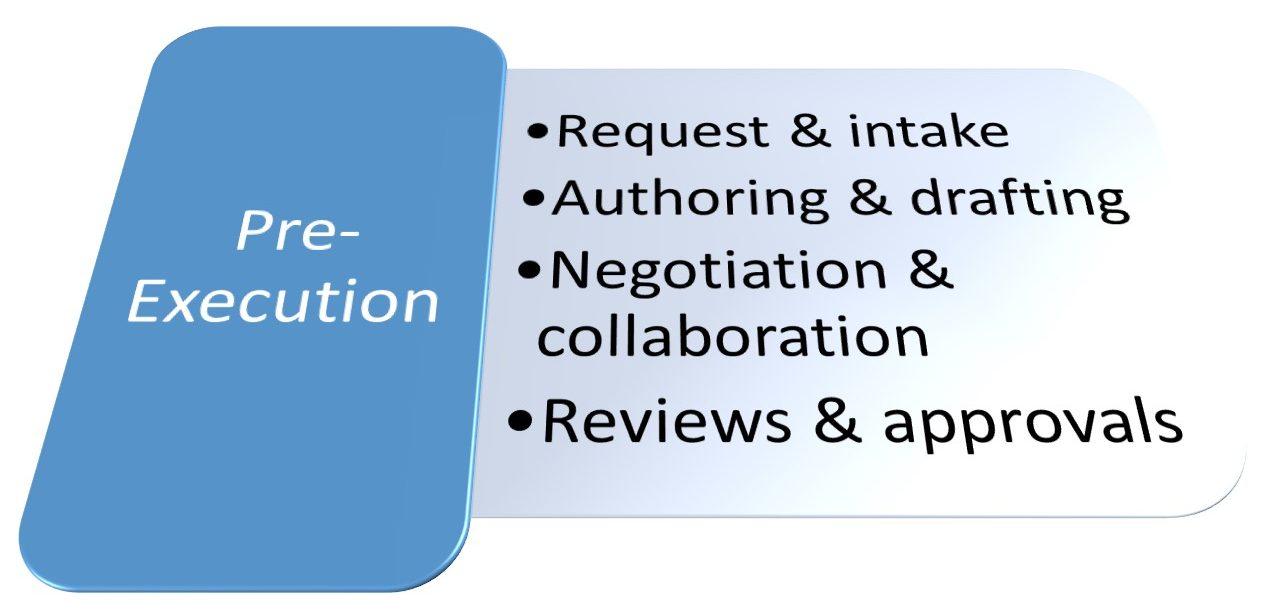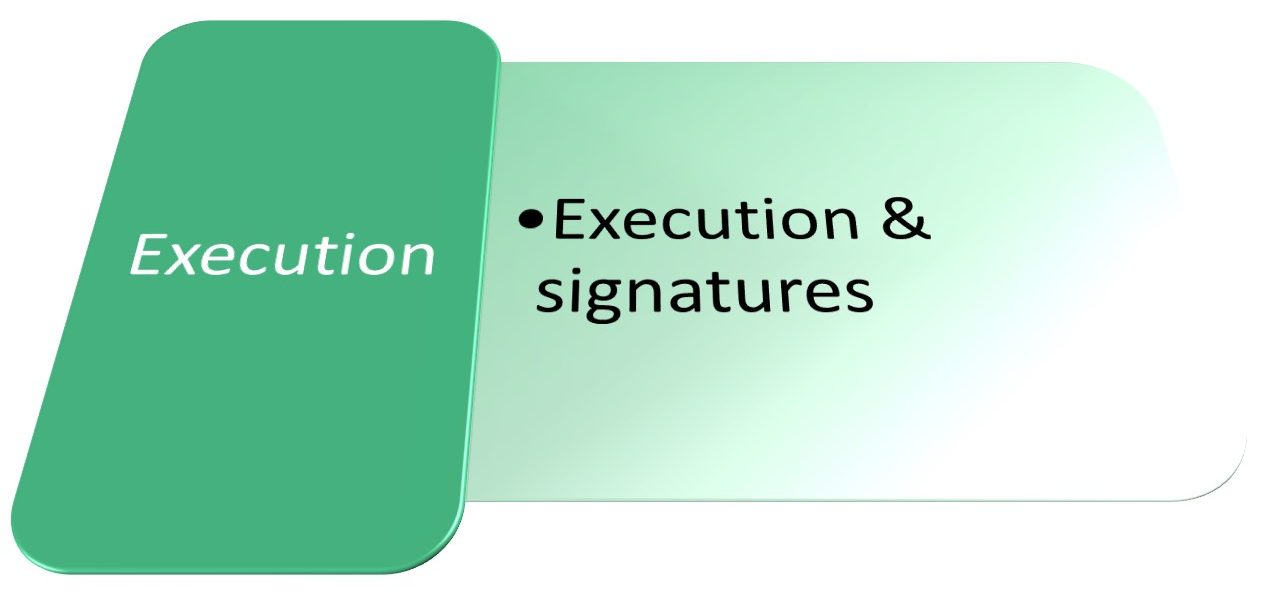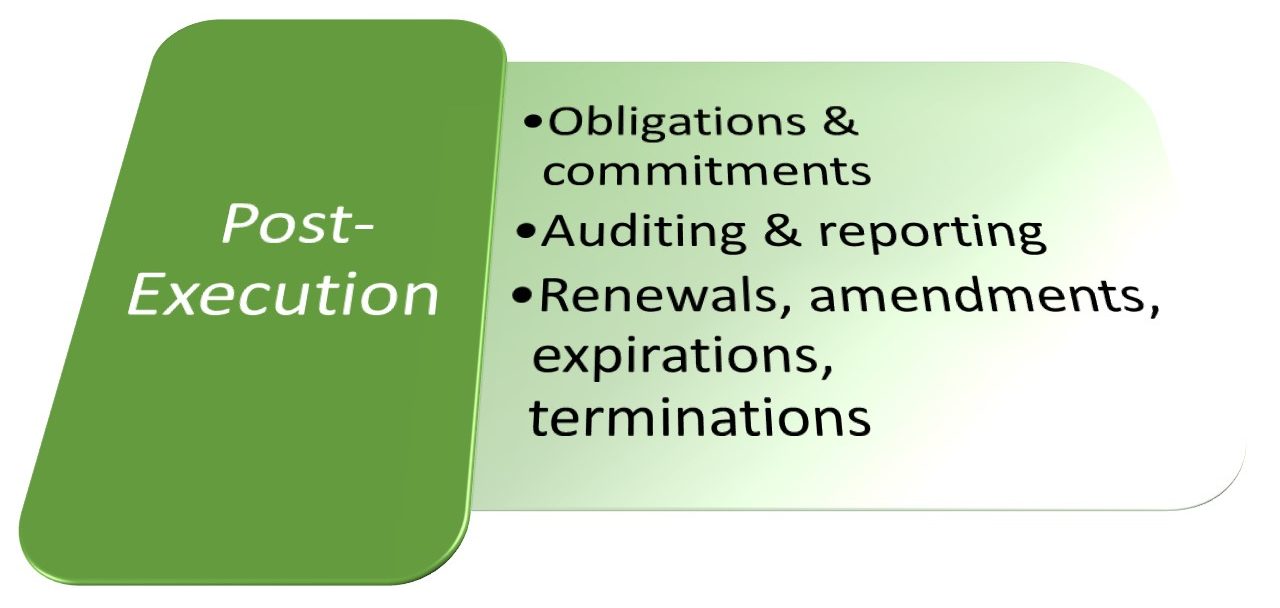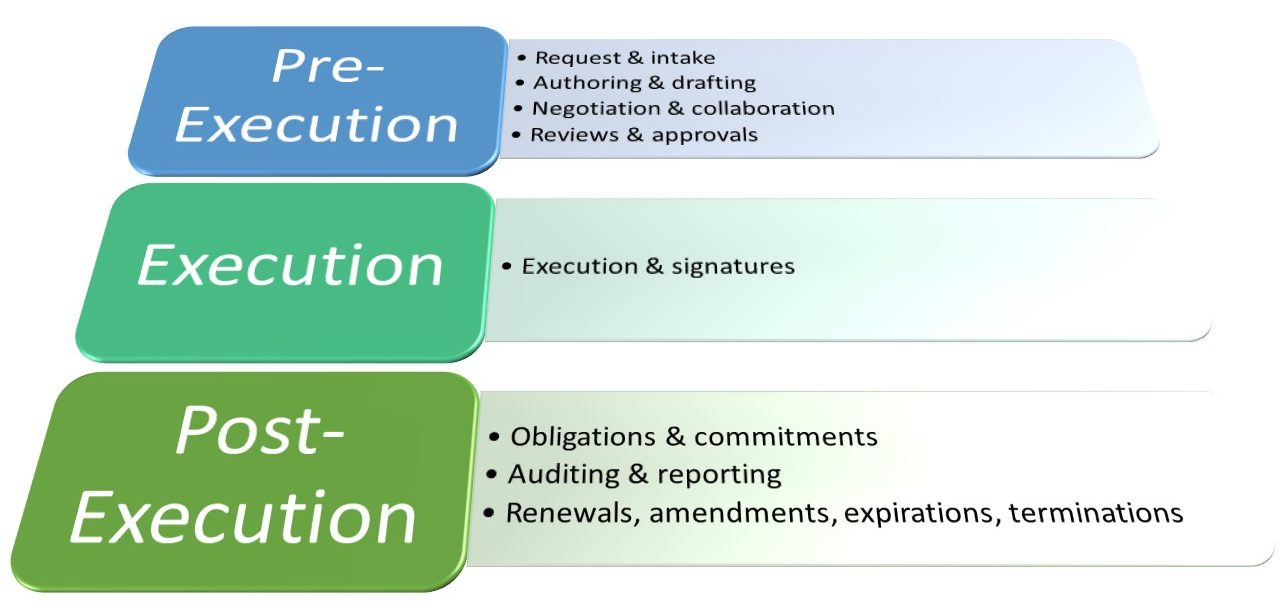3 Important Phases of the Contract Management Process
What are the three important phases of the contract management process?
Contract management can be complex but it’s easily broken down into three essential phases:
- Pre-execution
- Execution
- Post-execution
Read on to discover what activities each phase includes and how your organization can use contract lifecycle management software to simplify, accelerate, and automate the entire process.
Key Takeaways
- The pre-execution phase involves everything before the actual execution of the contract, including request and intake, authoring and drafting, negotiation and collaboration, and reviews and approvals.
- The execution phase involves executing and signing the contract.
- The post-execution phase involves everything after signing the contract, including managing obligations and commitments; auditing and reporting; and renewals, amendments, expirations, and terminations.
- You can automate all three phases of the contract management process with contract lifecycle management software to mitigate risk, increase compliance, and finalize business faster.
Phase 1: Pre-Execution

The first phase of the contract management process involves everything preceding the actual execution of the contract, starting with the initial contract request.
There’s a lot of activity that takes place pre-execution designed to ensure the successful execution of the contract. This includes:
Request & Intake
The pre-execution phase starts when a contract is first requested. The request should be accompanied by the intake of all necessary information, including:
- Goods and services involved
- Obligations and commitments
- Delivery dates
- Termination/renewal date
Authoring & Drafting
When the proper information is assembled, the first draft of the contract can be authored. This draft should include all the information gathered during the intake process, presented in the proper legal format and language.
Negotiation & Collaboration
The first draft of the contract is now circulated to all relevant parties, first those inside your company, then with external parties. If the two parties differ on specific terms, negotiations should ensue to reconcile all differences to both parties’ satisfaction.
Reviews & Approvals
The negotiated contract is now circulated to key stakeholders, including legal staff, for final review and approval. Once approvals are given, the contract is prepared for execution.
Phase 2: Execution

The second and most visible phase of contract management is the actual execution of the contract. All the terms and conditions have been negotiated and agreed on, and the contract has been fully reviewed and approved by appropriate staff from both parties. It’s now time to make the contract official.
For a contract to be legally executed, it must be signed by authorized representatives from both parties. Signing can be done either physically or electronically.
E-signatures are becoming more popular as they’re easier to circulate, more secure, and provide a digital trail that can be easily traced if necessary. E-signatures also speed up the execution process; Dropbox estimates that signing electronically can shorten document turnaround time by 80%.
Phase 3: Post-Execution

The final phase of the contract management process starts just as soon as the ink is dry on all the signatures – literally or virtually. There are obligations and commitments that have to be met, reports to be generated, and possible audits. That’s not even taking into account the disposition of a contract once its terms expire. All of these activities fall into the post-execution phase.
Obligations & Commitments
Relevant parties within your organization have to be notified of all contractual obligations to which they are committed. This entails the use of a tracking system to alert staff of upcoming deadlines – both from your organization and from the other party.
Auditing & Reporting
All executed contracts must be properly archived so that they can be easily accessed by relevant staff in the future. Digital storage is recommended as it makes indexing and searching much easier. Contracts also have to be accessible in case of any potential audits. It’s also important that content from each contract be input into your organization’s reporting system so that you can track performance and glean important insights.
Renewals, Amendments, Expirations, & Terminations
The final stage of the post-execution contract involves the disposition of the completed contract. This includes managing a contract’s renewal, expiration, or termination, as well as negotiating and registering any amendments and addendums to the contract.
Putting It All Together with Contract Lifecycle Management

All three phases of the contract management process can be automated and made more accurate and efficient by using contract lifecycle management (CLM) software, such as that offered by Contract Logix. CLM software manages all aspects of all three phases of contract management, from initial request to final disposition and everything in between.
By automating the entire contract management process, CLM software helps organizations realize numerous benefits, including the following:
- Faster contract process
- Easier negotiations
- Improved accuracy
- Reduced contract risk
- Enhanced regulatory compliance
In addition, CLM software can significantly reduce the cost of creating and executing new contracts. The World Commerce and Contracting group estimates that it costs anywhere from $3,800 to $6,900 to create a simple contract and over $100,000 to create more complex contracts. Automating the contract management process can shave thousands of dollars off these costs.
CLM software can also help you avoid many of the most common pitfalls associated with contract management.
Let Contract Logix Help You Automate All Phases of the Contract Management Process
Contract Logix’s CLM software can help your organization manage all three phases of the contract management process. Our Premium CLM Platform automates the entire contract management process, including a secure and central contract repository, standard request forms, clause and template libraries, workflows, real-time collaboration, e-signatures, alerts and notifications, and more.
We’ve helped hundreds of companies replace their legacy contract management processes with more efficient CLM solutions. We’ll show you how to make CLM work for your organization – and make your contract management faster, more robust, and more useful.
Contact Contract Logix today to learn more about automating all three phases of the contract management process.



